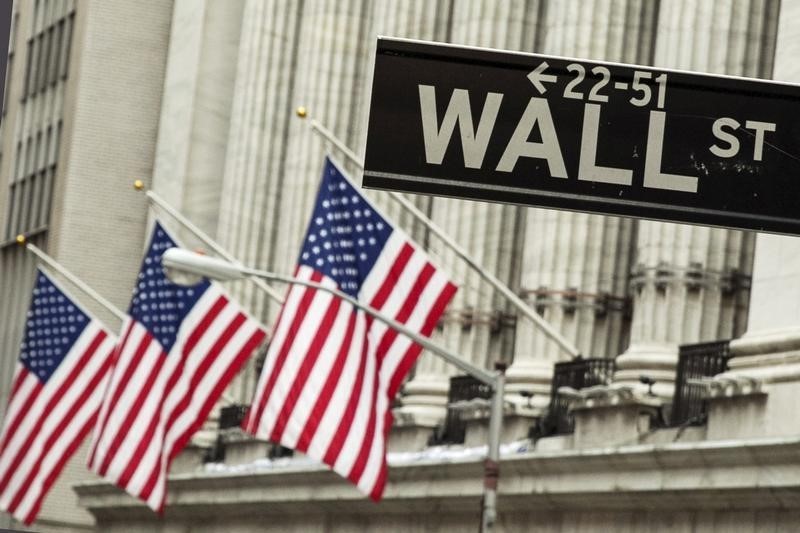Investing.com -- Stock futures point higher, suggesting a rebound for Wall Street's main indices following a day of declines on Tuesday. Elsewhere, the U.S. Senate makes headway on a bipartisan measure to avert a government shutdown that is now only days away, while Hollywood's writers guild votes to end a long-standing strike.
1. Futures move higher
U.S. stock futures inched up on Wednesday, pointing to a recovery in equities after a sell-off in the prior session that stemmed from investor concerns over an extended period of higher interest rates.
At 05:07 ET (09:07 GMT), the Dow futures contract added 103 points or 0.3%, S&P 500 futures jumped by 18 points or 0.4%, and Nasdaq 100 futures climbed by 61 points or 0.4%.
The main indices on Wall Street all slipped on Tuesday, with the 30-stock Dow Jones Industrial Average in particular slumping to its worst day since March. New data showing that consumer confidence fell to a four-month low in September due to elevated prices and recession fears weighed on sentiment.
Analysts suggested that these worries may have impacted shares in membership club Costco (NASDAQ:COST), which dropped in premarket dealmaking despite the company reporting better-than-anticipated quarterly profit and revenue.
In other corporate earnings, Micron (NASDAQ:MU) will post its fiscal fourth-quarter results following the close of trading on Wednesday, with attention likely to focus on how demand for the chipmaker's products is being fueled by a boom in the artificial intelligence sector.
2. Senate proposes temporary funding bill ahead of deadline
The U.S. Senate has voted to begin debate on a bill that would secure short-term funding for the government and avert a looming federal shutdown, although the legislation likely faces heavy opposition in the Republican-controlled House of Representatives.
The Senate's bill would keep the government funded until November 17 and include billions of dollars in aid for Ukraine and domestic disaster relief.
At the same time, the House proceeded with its own plans for a series of conservative-backed spending bills that would be unlikely to receive much support in the Democratic-majority Senate. House Speaker Kevin McCarthy has also said he would push the lower chamber of the U.S. Congress to sign off on a stopgap funding measure.
The contrasting tactics come as time is running out for lawmakers in Washington to avoid a government shutdown, which would take place on Sunday if a funding plan is not in place. The gridlock has threatened to damage Wall Street's view of U.S. government credit, with ratings agency Moody's (NYSE:MCO) especially worried.
3. Hollywood writers union votes to end strike
Leaders of Hollywood's writers union have unanimously voted to end a monthslong strike on Wednesday, in a move that allows its members to potentially return to work as they mull over a new contract deal.
The 11,500-strong Writers Guild of America (WGA) now has until October 9 to vote on the proposed three-year agreement, which includes pay rises, increased pension contributions, and some protections around the use of artificial intelligence.
Film and television writers first began the labor action in May following failed negotiations with large studios and streaming services like Warner Bros Discovery (NASDAQ:WBD) and Netflix (NASDAQ:NFLX).
However, this does not mean that Hollywood's entertainment industry has totally resumed normal service. A strike by the actors union is still ongoing, although hopes have brightened that talks will resume following the conclusion of the WGA walkouts.
4. Trump to address auto workers in Michigan after Biden visit
Former U.S. President Donald Trump will speak to auto workers in Michigan on Wednesday, as he looks to secure support from blue-collar voters in the crucial swing state ahead of the 2024 presidential election.
Trump, the Republican frontrunner, will likely use the address to criticize President Joe Biden's decision to provide incentives to promote electric vehicles, which he has warned will "annihilate" the U.S. auto industry and lead to thousands of job losses.
Biden himself was in Michigan on Tuesday, making an historic trip to the picket lines of striking members of the United Auto Workers union. A well-known pro-union leader, Biden told the workers to "stick with" the walkouts, adding that they should be enjoying the benefits of strong car company profits. The UAW thanked Biden for "stand[ing] with us," but stopped short of endorsing his 2024 re-election bid.
The rare back-to-back visits underscore just how important Michigan is to next year's presidential election. Along with Pennsylvania and Wisconsin, the state factored heavily into securing Biden's 2020 victory and Trump's 2016 win.
5. Oil prices rise after U.S. inventory data
Oil prices rose Wednesday as markets focused on supply tightness following the release of the latest U.S. inventories data heading into winter.
Industry data from the American Petroleum Institute released on Tuesday showed U.S. crude oil stockpiles rose last week by about 1.6 million barrels, against expectations for a small drop.
However, worries remained around low crude stockpile levels at a major storage hub in Oklahoma, which have added to concerns over supply tightness linked to extended output cuts by Saudi Arabia and Russia.
The official inventory data, from the Energy Information Administration, is due later on Wednesday.
By 05:08 ET, the U.S. crude futures traded 1.3% higher at $91.54 a barrel, while the Brent contract rose 0.9% to $93.25.
